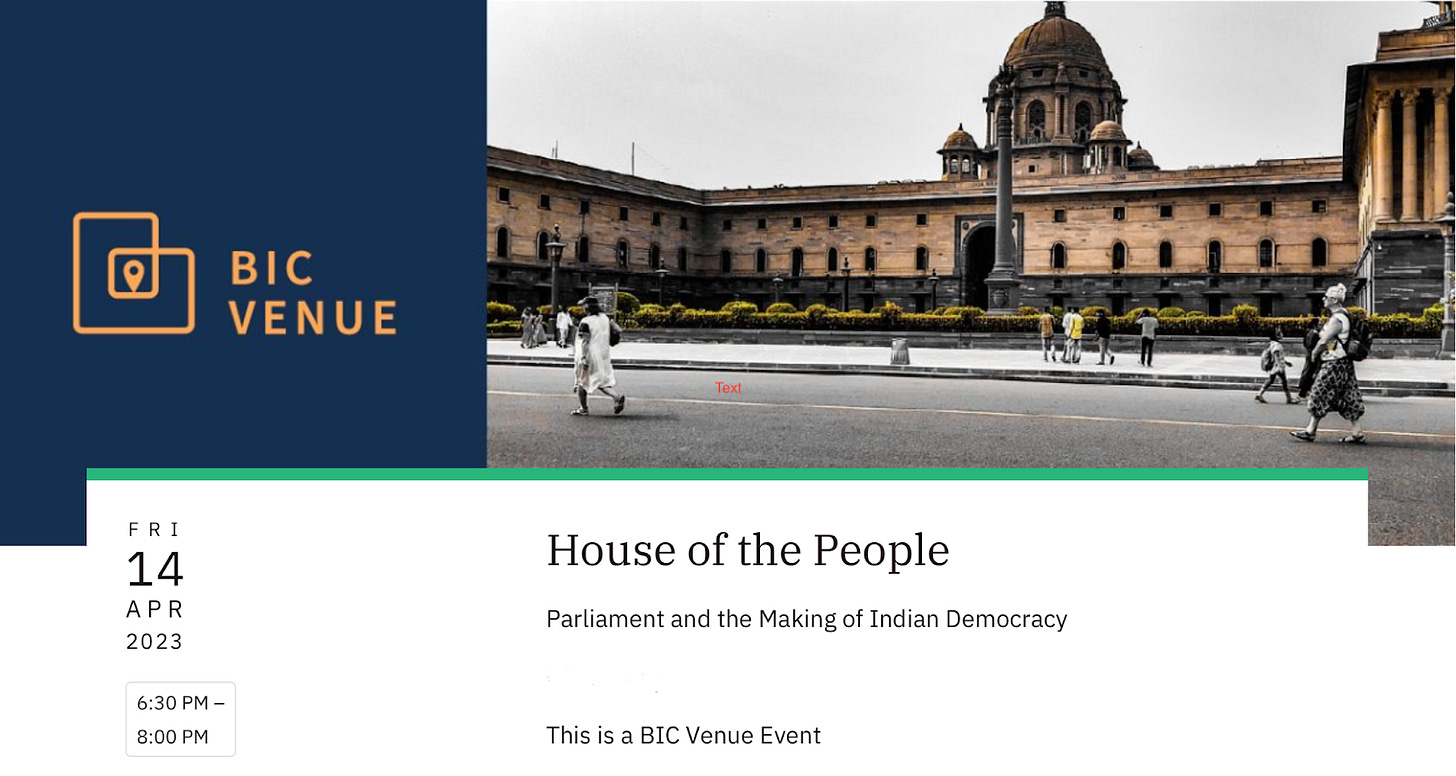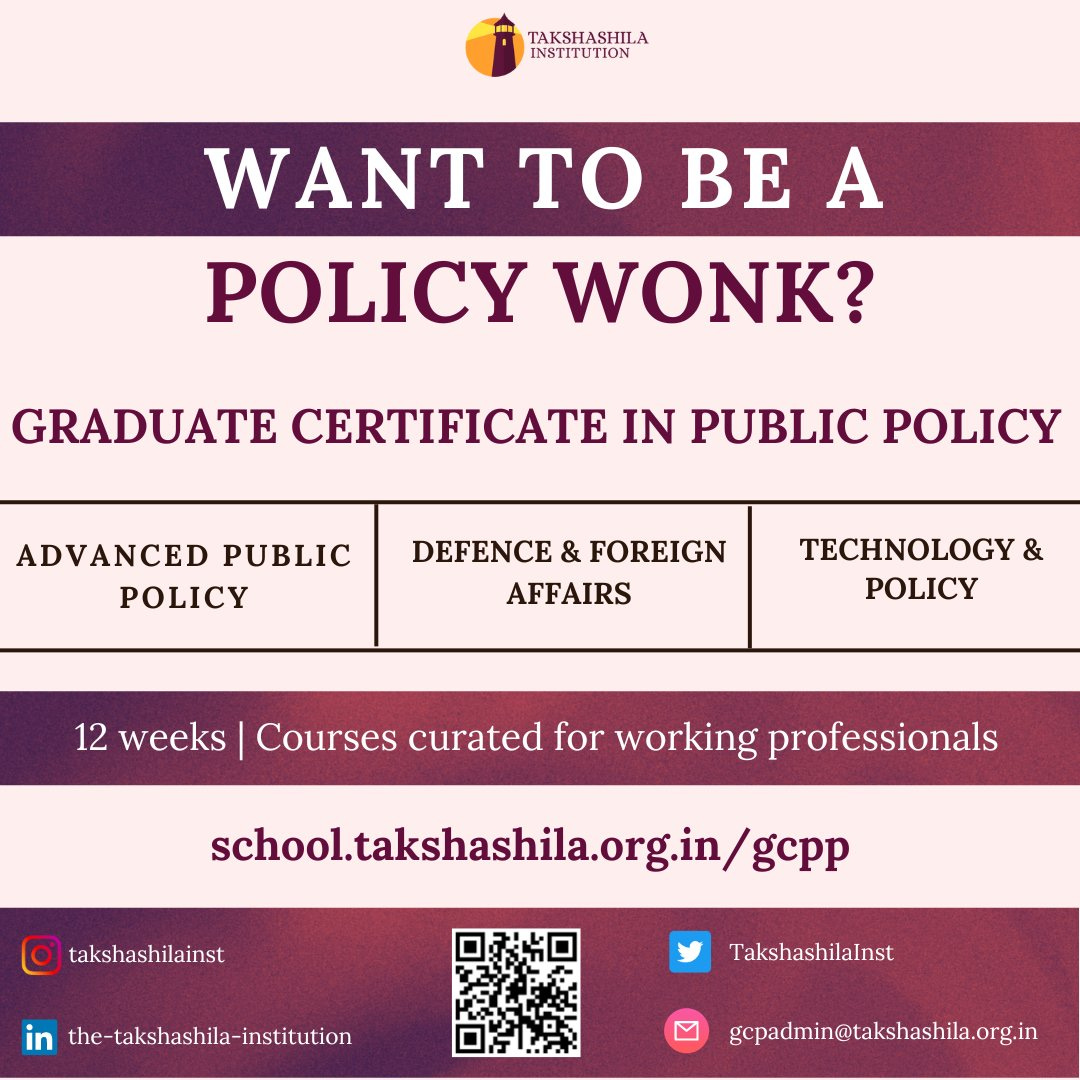House of the People: Making of Indian Democracy
Dear Reader,
Welcome to the Takshashila Dispatch.
In this edition, we bring to you our work on human resources management in the armed forces, takeaways from China’s recently concluded two sessions, Indian legal sector reforms, the debate on marriage equality, staying protected from doomerism and more!
Event | House of the People: Making of Indian Democracy
At an upcoming event at the Bangalore International Centre, Nitin Pai (Director, Takshashila) will be moderating a session where Dr Ronojoy Sen (Senior Research Fellow, Institute of South Asian Studies and the South Asian Studies Programme, National University of Singapore) will be in conversation with Dr Aparna Chandra (Associate Professor of Law, NLSIU) and Dr Rajeev Gowda (ex-MP, Rajya Sabha).
The discussion will be based on the book House of the People: Parliament and the Making of Indian Democracy, written by Dr Ronojoy Sen.
HR Issues in Services & Theatre Command System
In his weekly column for ThePrint, Lt. Gen. Prakash Menon writes on the need for fixing the human resource management issues faced by the tri-services before India could implement the proposed theatre command system:
Resolution of these issues can no longer be ignored lest solutions emerge in more painful ways. The three issues pertain to different standards of numerical assessments in the Annual Confidential Report (ACR) format prevailing in each Service, variance in tenure policy in higher ranks, and equivalence and variations in rank structures. None of these issues is new. But their salience will get magnified as integrated organisations come into being.
China’s Two Sessions & Impact on India
The sessions of National People’s Congress (NPC), China’s top legislature, and the Chinese People’s Political Consultative Conference (CPPCC), the top advisory body, recently concluded in Beijing. In an opinion for The Quint, Amit Kumar writes on the priorities of the Chinese government and their implications:
Economy, diplomacy, and driving innovation are perhaps the most pressing issues snaring at the Chinese decision-makers at present. While one would expect a policy that is stable and uniform on each of these fronts, what one instead notices, is policymaking that is marred with contradictions. But perhaps, Chinese progress is incomplete without contradictions that are central to the idea of the Marxist theory of the movement of history.
These contradictions, especially on the economic and diplomatic front, also have implications for India.
India’s Legal Sector Needs More Reforms
Following the Bar Council of India’s decision to allow foreign lawyers and law firms to practice in India, Shrikrishna Upadhyaya argues in his opinion for the Mint that India’s legal sector can grow if more reforms are implemented:
Allow FDI in Indian law firms: The next generation of reforms must be directed at allowing foreign direct investment (FDI) in the legal sector. Since persons not qualified to practise law in India are restricted from investing in a law firm, Indian law firms cannot receive FDI and must necessarily use their own money or domestic capital from other lawyers for investments and operations.
Given that almost all sectors of our economy have been opened up to FDI, including strategic sectors such as defence, railways, banking and insurance, it is unacceptable that Indian lawyers and law firms are not allowed to raise foreign capital.
A Case for Marriage Equality
While the Supreme Court of India is seized of the matter, in an opinion for the Deccan Herald, Saurabh Todi writes on marriage equality and dispels some common arguments presented against it:
Opponents of marriage equality wrongly assume that marriage has remained unchanged throughout history. Inter-caste, same-gotra, and inter-religious marriages all of which are legally and somewhat socially accepted now challenged traditional notions of marriage at some point. In a strict constitutional or civic sense, marriage is the legally recognised union of two people as partners in a personal relationship. Marriage is a culturally universal institution that is seen as the social way to form a committed partnership, and married couples usually enjoy more social support and acceptance than unmarried couples.
Protect Young Minds from Doomerism
As predictions of various kinds of apocalyptic events are aplenty today, in his column for the Mint, Nitin Pai argues that many of these are vastly exaggerated claims and need not influence young minds:
At some point in the past 20 years, we crossed the point of making people more aware of problems and rallying them for change to scaring the living daylights out of them. The toll on their mental health has been severe.
The apocalyptic mindset is already affecting their personal and political decisions. I do not think a fearful and anxious population instantly connected on global networks is best placed to make good decisions about our collective future. The brain cannot make rational choices under continuous duress. Instead, adrenaline and knee-jerk intuition combine to offer extreme responses that get mistaken for solutions.
Individuals and the Indian State
In an episode of Ideas of India, Shruti Rajagopalan speaks with Pranay Kotasthane & Raghu S. Jaitley about the intersections of markets, society and the state and they discuss the importance of individual decision-making, self-governance versus good governance, why economic growth is a moral imperative, the persuasive power of Indian cinema and much more:
Incentivising Property Ownership Among Women
The extent of female property ownership impacts women and their families, society, and the economy. Governments provide gender-based tax incentives to increase female property ownership.
Suman Joshi and Sarthak Pradhan discuss the effectiveness of these measures as outlined in a recent World Bank working paper.
Applications for GCPP May Cohort are Open
The GCPP is offered over 12 weeks and is the ideal introductory course to public policy and governance for working professionals. It will help you master the fundamentals of economics, policy evaluation, ethical reasoning, effective communication and public persuasion. All classes are online and held on weekends.
The GCPP is available in three streams: Defence and Foreign Affairs, Technology & Policy & Advanced Public Policy.
Applications for the May 2023 Graduate Certificate in Public Policy (GCPP) cohort are open till April 23, 2023. The next cohort of GCPP begins on May 6, 2023.
That’s all from us this week. Have a great day!





